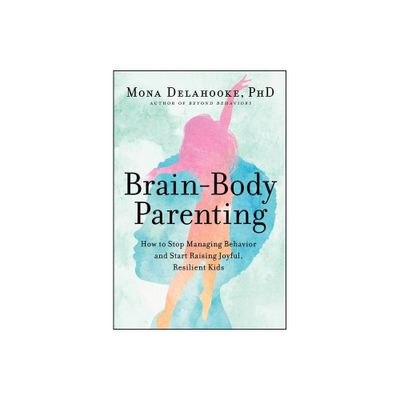Home
Brain-Body Parenting: How to Stop Managing Behavior and Start Raising Joyful, Resilient Kids
Loading Inventory...
Barnes and Noble
Brain-Body Parenting: How to Stop Managing Behavior and Start Raising Joyful, Resilient Kids
Current price: $27.99


Barnes and Noble
Brain-Body Parenting: How to Stop Managing Behavior and Start Raising Joyful, Resilient Kids
Current price: $27.99
Loading Inventory...
Size: Audiobook
*Product Information may vary - to confirm product availability, pricing, and additional information please contact Barnes and Noble
NATIONAL BESTSELLER
From a leading child psychologist comes this groundbreaking new understanding of children’s behavior, offering insight and strategies to support both parents and children.
Nominated for Malcolm Gladwell, Susan Cain, Adam Grant, and Daniel H. Pink's Next Big Idea Club
Over her decades as a clinical psychologist, Dr. Mona Delahooke has routinely counseled distraught parents who struggle to manage their children’s challenging, sometimes oppositional behaviors. These families are understandably focused on correcting or improving a child’s lack of compliance, emotional outbursts, tantrums, and other “out of control” behavior. But, as she has shared with these families, a perspective shift is needed. Behavior, no matter how challenging, is not the problem but a symptom; a clue about what is happening in a child’s unique physiologic makeup.
In
Brain-Body Parenting
, Dr. Delahooke offers a radical new approach to parenting based on her clinical experience as well as the most recent research in neuroscience and child psychology. Instead of a “top-down” approach to behavior that focuses on the thinking brain, she calls for a “bottom-up” approach that considers the essential role of the entire nervous system, which produces children’s feelings and behaviors.
When we begin to understand the biology beneath the behavior, suggests Dr. Delahooke, we give our children the resources they need to grow and thrive—and we give ourselves the gift of a happier, more connected relationship with them.
empowers parents with tools to help their children develop self-regulation skills while also encouraging parental self-care, which is crucial for parents to have the capacity to provide the essential “co-regulation” children need. When parents shift from trying to secure compliance to supporting connection and balance in the body and mind, they unlock a deeper understanding of their child, encouraging calmer behavior, more harmonious family dynamics, and increased resilience.
From a leading child psychologist comes this groundbreaking new understanding of children’s behavior, offering insight and strategies to support both parents and children.
Nominated for Malcolm Gladwell, Susan Cain, Adam Grant, and Daniel H. Pink's Next Big Idea Club
Over her decades as a clinical psychologist, Dr. Mona Delahooke has routinely counseled distraught parents who struggle to manage their children’s challenging, sometimes oppositional behaviors. These families are understandably focused on correcting or improving a child’s lack of compliance, emotional outbursts, tantrums, and other “out of control” behavior. But, as she has shared with these families, a perspective shift is needed. Behavior, no matter how challenging, is not the problem but a symptom; a clue about what is happening in a child’s unique physiologic makeup.
In
Brain-Body Parenting
, Dr. Delahooke offers a radical new approach to parenting based on her clinical experience as well as the most recent research in neuroscience and child psychology. Instead of a “top-down” approach to behavior that focuses on the thinking brain, she calls for a “bottom-up” approach that considers the essential role of the entire nervous system, which produces children’s feelings and behaviors.
When we begin to understand the biology beneath the behavior, suggests Dr. Delahooke, we give our children the resources they need to grow and thrive—and we give ourselves the gift of a happier, more connected relationship with them.
empowers parents with tools to help their children develop self-regulation skills while also encouraging parental self-care, which is crucial for parents to have the capacity to provide the essential “co-regulation” children need. When parents shift from trying to secure compliance to supporting connection and balance in the body and mind, they unlock a deeper understanding of their child, encouraging calmer behavior, more harmonious family dynamics, and increased resilience.


















